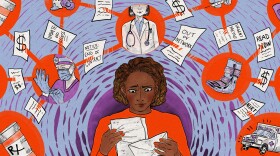-
A new report found that nearly 10% of median household income in Missouri and Kansas goes toward deductibles and premiums. At that level, economists say those households are underinsured.
-
As of Dec. 30, there were 46 high wind warnings in Nebraska in 2025. That count ties the record high since the agency started keeping track of that statistic 20 years ago.
-
Congress is poised to leave for a scheduled holiday recess without a solution for addressing the expiration of enhanced subsidies for Affordable Care Act marketplace plans. "I do know the effect on people at home," Hawley told NPR after the Senate vote.
-
Medicare Advantage, a private alternative to traditional Medicare, offers extra benefits and low monthly premiums. However, prior authorizations and claim denials complicate this increasingly popular — and profitable — program for Medicare beneficiaries and their health care providers.
-
Some of the country's highest home insurance prices are in the central U.S., a region generally considered to be protected from climate-driven disasters such as wildfires and hurricanes.
-
Patients sometimes find themselves scrambling for affordable care when their insurer and hospital can't agree. That's what happened to Columbia, Missouri, resident Amber Wingler after MU Health Care got into a contract dispute with Anthem.
-
In the wake of the May 16 tornado, applications for demolition permits on private property doubled. Property owners are making tough decisions to raze their homes, and whether to stay or leave the city.
-
Health insurance premiums are expected to jump in 2026, and many Kansas City businesses say they’ll be forced to pass some of the increase on to employees.
-
With no pediatric ophthalmologists in network near their home in Wentzville, Missouri, Keyanna Jones asked United Healthcare to cover her daughter's eye surgery with an out-of-network specialist. The insurer agreed — and then sent them a bill for $13,000.
-
Insurance companies have proposed the highest rate increases since 2018. Health care analysts blame Trump administration policies, which will raise prices and drive healthy people out of the marketplace.
-
New Madrid, Missouri, was terrorized by its fault line in the early 19th century, and earthquakes are still the region's claim to fame. But these days, earthquake insurance is prohibitively expensive.
-
Information is emerging about how many people in north St. Louis did not have homeowners insurance when storms ripped through the region on May 16. Still, the data is just an early estimate, against the backdrop of a rising number of homeowners around the country who don't have policies.
Play Live Radio
Next Up:
0:00
0:00
Available On Air Stations












